- Home
- Franklin Horton
Masters of Mayhem
Masters of Mayhem Read online
Copyright © 2019 by Franklin Horton
Cover by Deranged Doctor Design
Editing by Felicia Sullivan
All rights reserved.
No part of this book may be reproduced in any form or by any electronic or mechanical means, including information storage and retrieval systems, without written permission from the author, except for the use of brief quotations in a book review.
Created with Vellum
Contents
Chapter 1
Chapter 2
Chapter 3
Chapter 4
Chapter 5
Chapter 6
Chapter 7
Chapter 8
Chapter 9
Chapter 10
Chapter 11
Chapter 12
Chapter 13
Chapter 14
Chapter 15
Chapter 16
Chapter 17
Chapter 18
Chapter 19
Chapter 20
Chapter 21
Chapter 22
Chapter 23
Chapter 24
Chapter 25
Chapter 26
Chapter 27
Chapter 28
Chapter 29
Chapter 30
Chapter 31
Chapter 32
Chapter 33
Chapter 34
Chapter 35
Chapter 36
Chapter 37
Chapter 38
Chapter 39
Chapter 40
Chapter 41
Chapter 42
Chapter 43
Chapter 44
Chapter 45
About the Author
Also by Franklin Horton
1
Bryan Padowicz sipped a cup of coffee and stared out the frosty window of his cabin. Beyond it, Douthat Lake held a crescent of floating leaves collected by the current and dropping over the rustic stone overflow a few at a time. Fall was deepening and Bryan would guess that most of the leaves had fallen off the trees by now. They would all be gone soon and a depressing winter would settle on them like bad news.
A ragtag assortment of dirty women dressed in ill-fitting clothes were making their way down a leafy walkway along the lake, heading to work on the crops. The group’s winter food, their financial security, the very future of Bryan’s noble project rested upon the fruits of those women’s labor. As sad as it was, that handful of women represented nearly everything he had left of his prisoner workforce.
At one point he had forty to fifty women held at his farm, a former state park. He was planning to double that by this winter but nothing had gone as intended. The women, conniving witches to the very last one, had schemed and plotted, poisoning the men's clothes with some extract of poison ivy, driving the men nearly mad with itching. Some of the men tore at their flesh until it became infected and they had to be treated in the infirmary.
In the midst of their itching misery, when the men of Douthat Farms were distracted by their constant discomfort, the women turned on them with the tools of their labors. Hoes, shovels, mattocks, soup ladles, and laundry cudgels became weapons that battered and killed their guards. As a result, over half of Bryan’s workforce of captive women escaped. A handful were shot and killed in the commotion. What remained were pitiful and downtrodden, demoralized waifs praying for their own deaths. Bryan had to admit it looked as if the collective efforts of these poor women and his remaining men would not be enough to carry this operation through the winter.
After the rebellion, as Bryan referred to it, he sent two dozen of his best men on a journey south to bring back more women. He didn’t want women collected locally because he feared it might motivate the locals to turn on him. It had been several weeks and they had not returned. Bryan didn't have many more men to spare. He sent out the occasional rider when he could, looking for signs of his party, but they found nothing. Sometimes locals indicated they’d seen riders pass but no one knew what happened to them.
He didn't have enough men left to send out another raiding party. Although they needed more captives, he barely had enough men to run the day-to-day operations. Without labor, they were doomed. He wasn’t sure what to do.
A couple of days ago he sent an emissary into a local town and managed to hire a couple of men. He’d always been reluctant to do that before, fearing that local men might reveal details of their operation. He didn't want the town to know he was raising drugs to sell. Nor did he want them to know he was using captive women to do it. In desperation, he hired two men, fed them, and put them on sentry duty, which required fewer skills than many of the other tasks.
The pair disappeared yesterday and took two more of the captive women with them. It was possible they would tell other folks about the slaves. It was yet one more thing to worry about. While Bryan still had dreams that his Douthat Farms estate could turn into a modern day Monticello and him a modern-day Thomas Jefferson, that hope faded more with each day.
He understood the lights would probably come back on one day soon and all of this would go away. The clock was ticking. He had to stake his claim and build a fortune before order was restored. People would trade their worthless cash, property, and more for the food he grew. When the lights came back on, all of that cash and property would make him a wealthy man, but without slave labor he would earn nothing. Loss hung over him like the darkness of an approaching storm.
Bryan finished his coffee, placed the mug on the empty kitchen countertop, and returned to the living room to stoke the fire. He dressed warmly for a morning outdoors, strapping on a Colt 1851 Navy revolver. It was an affectation he adopted because he never actually expected he would have to fire his weapons. They were show. Part of his costume. He wasn’t even a very good shot.
He hung an AK-47 over his shoulder before stepping out the door. He hadn’t even reached the edge of his porch when he saw a figure in work pants and a hoodie jogging toward him. It was Michael, who led the work crews that tended the greenhouses. When he saw Bryan, he raised a hand in greeting and slowed to a walk. He was still trying to catch his breath when he reached the base of the steps.
"This better not be bad news,” Bryan said. “I have no more room in my soul for it."
Michael was still breathing too hard to talk but raised his eyes with a wary hesitation that could only mean he had nothing good to pass on. "The marijuana is gone," Michael gasped. “Somebody cut off the lock and ripped up all the plants. They took it all.”
“There were over a hundred mature plants,” Bryan said. “They got all of them?”
“There are footprints everywhere. There must have been a couple of people.”
Bryan sighed. It had to be the local men they’d hired, the ones who just ran off with two of the women captives. The greenhouses were secluded, located inside old maintenance sheds used by the state park staff. The lights ran off solar equipment that Bryan had installed himself.
It wasn’t likely someone just came across them. A few weeks ago he had guards on those greenhouses all night but he didn’t have the men for that now. If they’d still been there, this never would have happened. Now he barely had enough men to keep the woodstoves in the greenhouses going.
“Are the poppies okay? The vegetables?" Bryan asked. There was a hint of desperation in his voice that almost embarrassed him. He needed some good news.
"I'm not sure," Michael replied. “I don’t think so.”
“They took those too?”
“Not exactly,” Michael said. "Whoever stole the marijuana plants broke into the other greenhouses and trashed everything. Turned the plants over and hacked them up with machetes. Then they left the doors open so the temperature inside dropped into the twenties. I th
ink everything they didn’t damage is probably too shocked to survive.”
Bryan stood there stoically, resisting the impulse to sling his AK into the yard, scream, and curse. He had been so close. Everything was nearly to the point of harvesting. He was angry and hurt on so many levels. Worse yet was the crumbling of his dreams before his very eyes. He'd grown marijuana for enough years that he was certain of his horticultural skills. He’d raised the marijuana to sell and trade for other goods. He raised the poppies for making opium to sell and trade.
For the people who didn’t want drugs, he was raising enough food that he could support his own folks and still trade for other things they needed. Now he would be lucky if they had enough food on hand to make it through the winter themselves. He was nearly certain they didn’t. His people would soon be reduced to scavenging like everyone else. How loyal would they be to him then? How dedicated would they remain to his vision, the birth of a magnificent estate that would enrich him and his family for generations, that would successfully support those who believed in him?
"Is there anything left?"
"The potatoes are probably still safe. We planted those in five-gallon buckets so I’m sure the soil protected them. There’s a lot of them but I don’t know if we can survive off them or not."
Bryan was crushed but continued to push his emotions inward. He needed to be a problem solver, a leader. People were depending on him. His descendants were depending on him. “Harvest all the potatoes. Store them in the root cellar."
Michael shifted uncomfortably. “The cellars were not completed. You put men on it just before the revolt but they only got a couple of days into it. All we have is a hole in the ground beside the dining hall. It’s about the size of a large grave but has no roof and no door.”
Bryan lowered his head to his chest and took a deep breath, speaking through gritted teeth. "Dig. The. Potatoes. Put them in. The dining hall. For now. Make sure it's warm enough that they don't freeze. Gather all the men. In the dining hall. I’ll meet you there. In one hour.”
Michael hurried off, anxious to escape the uncomfortable and disappointing line of inquiry. He was fully aware he’d delivered nothing but bad news. Most of the employees at Douthat Farms thought Bryan was eccentric but none of them made the mistake of thinking he was harmless. He made erratic decisions sometimes. Occasionally, people paid with their lives. Michael had stood in fear throughout that entire conversation, certain he was about to pay the ultimate price for a situation he’d played no part in.
Bryan spun stiffly on his heel and went back inside his cabin. He unslung his rifle, replacing it on the rack among the historical weapons he’d stolen from a nearby museum. He went to his desk and sagged into his antique chair, leaned back with his limbs splayed in all directions. He was very nearly a broken man. He felt the burden of a defeated general or the leader of a crime family as the Feds were closing in. How could he handle this?
He sprung to his feet and strode to an antique crystal decanter resting on a Queen Anne table. The claw-and-ball feet reminded him of his mission and his place in history, or rather the place he intended for himself in history. He removed the top from a Ravenscroft decanter and poured himself a tumbler of a 1988 Macallan single-malt Scotch. The sip turned into a hasty slug. It was an abomination to gulp such a fine liquor but it couldn’t be helped.
He poured another and went to his desk, laying his head down on the bare wood. Was he done? Was this where he called it quits? Where he hung up his Jeffersonian ambitions and went home?
The founding fathers were not the type of men who gave up in the face of hardship and Bryan did not want to be that type of man either. He raised back up and sat with more authority, stiffened his spine, and picked up his tumbler of scotch. He could retake the reins of this team of horses at this very moment or he could let it run to its own destruction. Which would it be?
He sighed deeply and stood, removing his vintage leather belt with its Colt Navy revolver. He piled belt, holster, and revolver on his desk. Across the room, he selected a Colt 1911 .45 automatic from a wooden pistol rack. While perhaps not as modern as a Glock or a Sig, it gave him the ability to reload from magazines while still retaining a little more classical styling. He ejected the magazine and found it to be full. He replaced it in the handgun, cycled the slide, and made certain the safety was on. He tucked it into his belt and put three spare magazines into his vest pocket.
He hung the AK over his shoulder and returned to his porch. The cold air was sobering but he still felt a general state of numbness brought about by the drink, the ebbing adrenaline, and the fugue state of such a profound indecision. He wasn't certain how long he’d been inside thinking this over. Had it been just minutes or was it closer to an hour? Either way, he was back in the game now and the path forward was clear to him.
He descended the creaking porch steps and strode boldly toward the dining hall, his spine stiff with resolve and determination. He neared the building and saw the puff of wood smoke from the stone chimney. Just outside the dining hall was a wide porch with a plank bench filled with the remaining women captives, the main workforce of Douthat Farms. The men must have left them outside, unsure of what Bryan wanted to discuss with them.
Bryan stopped in front of the women and regarded them with no emotion. They were a haggard and sorry lot. Sadly, he could assign no blame for their appearance to anyone other than himself. It was his doing, his failure, staring him right back into his face. Only he could fix it. Only he could right the ship.
The Colt 1911 was in his hand before anyone even noticed. The shots rang loud in the silent valley. He shot three of the women in the head at point-blank range before any of the others even reacted. But now they knew what was coming. They could see it in his eyes and they scrambled to get away, screaming and crying.
It was a futile effort. They were lashed one to another like a string of packhorses. When the first fell dead, the remaining women found themselves anchored to the three dead bodies and could make no escape. The remaining women were not clean kills. They were struggling and flailing about, making it difficult for a headshot even at this close range. He fired center mass to disable them and then the pistol ran dry, the slide locking back.
He reloaded and picked up where he’d left off. When the last shot echoed to silence, Bryan’s remaining captives lay dead, their blood running in thin rivulets down the gently sloped planks. It ran from the edge of the porch and into flower beds once perfectly appointed by a state botanist but now weedy, overgrown, and blood-soaked.
Bryan stared at his handiwork. He heard the creak of floorboards and turned to find his men standing behind him. When they heard his gunshots, they assumed the worst, rushing to his side with their guns out and ready for a fight. When they found him, discovered his deeds, they did not join but watched frozen and terrified.
Bryan smiled at his men. He felt reinvigorated, ready to reassume the mantle of leadership. It was a new day. It was a new era. Today, they rose from the ashes.
"We need to talk," he said. “Let’s go inside.”
2
The sun rose to a frosty morning on top of Jewell Ridge. While the temperature would probably hit the mid-fifties later, there was no ignoring that cooler days were upon them. Barb woke to a chilly bedroom, but the warmth of the main living area put a smile on her face. The heat of the fire and undercurrent of wood smoke in the air always meant comfort to her. Despite all the things that changed in her life—that changed in the world at large—the appreciation of a warm fire on a cold morning was like a universal truth, like a law of physics. It connected the twenty-first century man with first century man and beyond.
"Morning, sweetie."
Barb turned to smile at her father, feeling a twinge of pain in her chest, an injury from the kidnapping that was not completely healed yet. Her dad extended a mug to her.
"You can have this coffee," he said. "I’ll make myself another."
She regarded the mug with its Coffe
e Makes Me Poop inscription and shook her head. “No thanks.”
"What is it? I’ve not even had a sip from it."
"I can find my own mug."
Conor looked from his daughter to his mug and back. "But it's my favorite mug. To allow someone to use one of your most prized possessions is to bestow an honor upon them. I feel like you just kicked my honor in the begonias. Besides that, you picked this mug out."
"I picked it out because it's perfectly suited for you. It's not befitting of me."
"So you're too damn good to drink out of me mug?" Conor asked with dramatic flourish.
"You’ve obviously forgotten I’m a delicate feminine flower that drinks with my pinky extended and without slurping noises. I can find my own bleeding mug and make my own morning beverage, thank you."
Conor withdrew his arm and shielded his mug protectively. "Didn't want you using me mug anyway. I don't like it when my coffee smells like delicate feminine flowers."
Barb padded off toward the kitchen mumbling about the state of her dad’s mental health. Conor smiled at her camouflage cargo pants, Wilson Combat t-shirt, and fuzzy pink house slippers.
“It be the lucky man that wins your hand one day, my daughter,” Conor called out. “Though I’m certain he’ll have to fight like hell to get it.”
Barb stopped in the kitchen door. “What are you saying back there?” she asked, a note of both suspicion and warning in her voice.

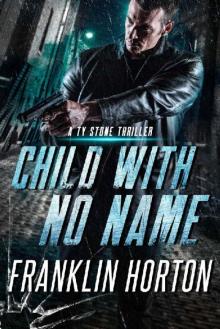 Child With No Name
Child With No Name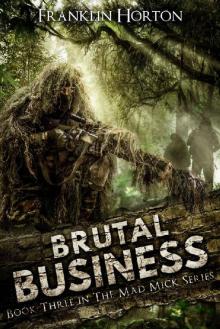 Brutal Business: Book Three in the Mad Mick Series
Brutal Business: Book Three in the Mad Mick Series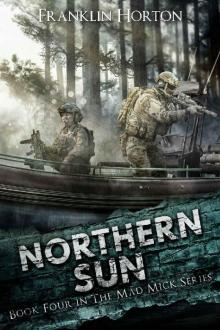 Northern Sun: Book Four in The Mad Mick Series
Northern Sun: Book Four in The Mad Mick Series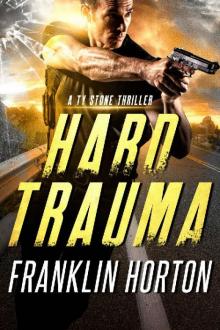 Hard Trauma
Hard Trauma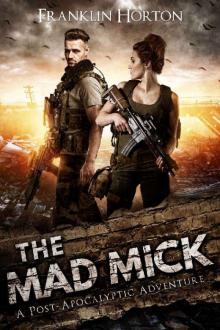 The Mad Mick: Book One of The Mad Mick Series
The Mad Mick: Book One of The Mad Mick Series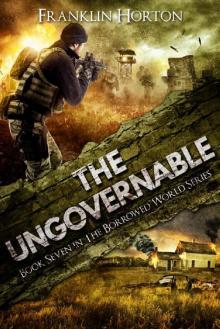 The Ungovernable
The Ungovernable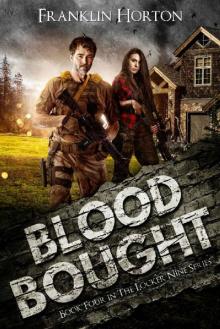 Blood Bought: Book Four in The Locker Nine Series
Blood Bought: Book Four in The Locker Nine Series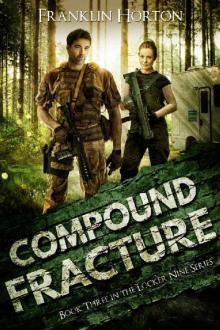 Compound Fracture
Compound Fracture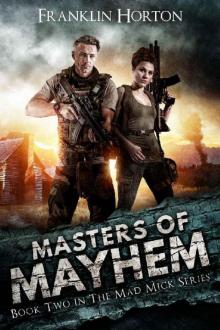 Masters of Mayhem
Masters of Mayhem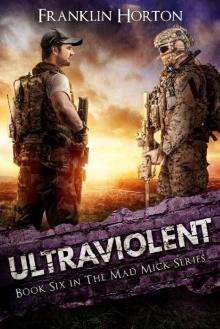 Ultraviolent: Book Six in The Mad Mick Series
Ultraviolent: Book Six in The Mad Mick Series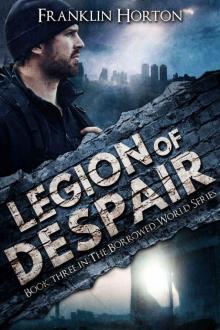 The Borrowed World (Book 3): Legion of Despair
The Borrowed World (Book 3): Legion of Despair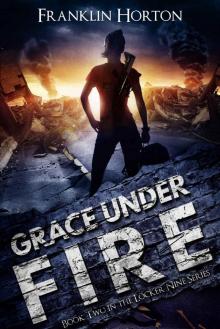 Grace Under Fire: Book Two In The Locker Nine Series
Grace Under Fire: Book Two In The Locker Nine Series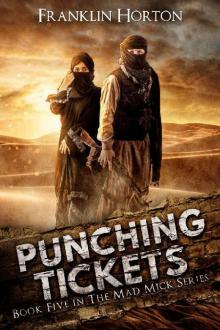 Punching Tickets: Book Five in The Mad Mick Series
Punching Tickets: Book Five in The Mad Mick Series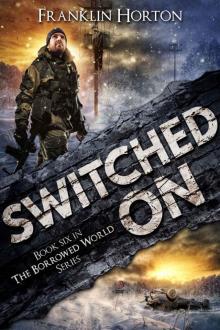 Switched On: Book Six in The Borrowed World Series
Switched On: Book Six in The Borrowed World Series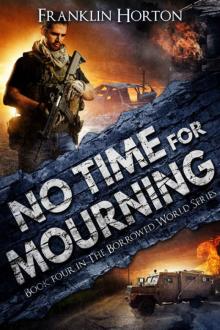 No Time For Mourning: Book Four in The Borrowed World Series
No Time For Mourning: Book Four in The Borrowed World Series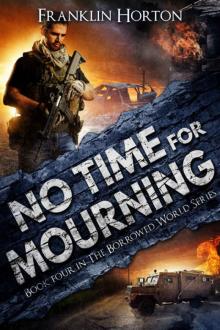 The Borrowed World (Book 4): No Time For Mourning
The Borrowed World (Book 4): No Time For Mourning Random Acts
Random Acts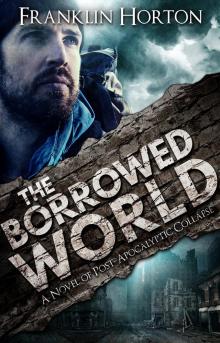 The Borrowed World: A Novel of Post-Apocalyptic Collapse
The Borrowed World: A Novel of Post-Apocalyptic Collapse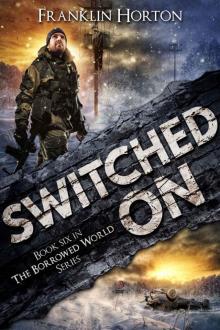 Switched On
Switched On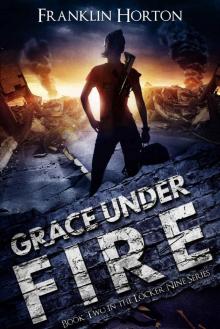 Grace Under Fire
Grace Under Fire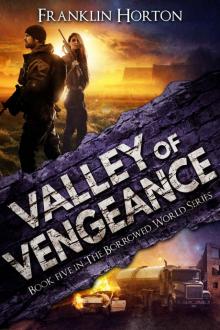 Valley of Vengeance: Book Five in The Borrowed World Series
Valley of Vengeance: Book Five in The Borrowed World Series